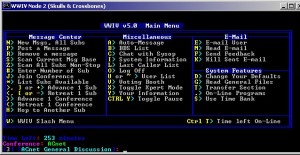Back before the Internet became ubiquitous, we had bulletin board systems. These were basically one computer with a modem, running software that simply recorded typed conversations between users. This was different than e-mail, because all members of the bulletin board could read the messages, you had an audience, and there was a record of what had been said up to that point that was easily reviewable. One of the weirdest things I learned about when first getting into this was that the list of conversation messages was called “a thread.” It conjured an image of the Greek Fates, mythological goddesses who spun the thread of life through all creation. Really sounded quite splendid.
Threads became a new way of holding discourse. Back in the day, for me mostly, this was about the cool new science fiction shows that were coming out, or the latest novels, things happening in your college, or how to fix your computer. Useful, friendly topics that rarely started significant arguments.
 One thing you have to understand here is that you 1) had to be personally identified and allowed on most bulletin board systems, and 2) the owner of the system could disallow your access if you weren’t behaving. This was coupled with the fact that computers were expensive, most people who had them were fairly well educated and working in technology, and for the most part were well-behaved. The early Internet was pretty good at policing itself, and people knew that their reputations were worth something in the long run so they protected them. Of course there were exceptions, this was where the term “internet troll” or “trolling” originated, as well as the occasional “flame war“, but calm discourse was pretty much the norm.
One thing you have to understand here is that you 1) had to be personally identified and allowed on most bulletin board systems, and 2) the owner of the system could disallow your access if you weren’t behaving. This was coupled with the fact that computers were expensive, most people who had them were fairly well educated and working in technology, and for the most part were well-behaved. The early Internet was pretty good at policing itself, and people knew that their reputations were worth something in the long run so they protected them. Of course there were exceptions, this was where the term “internet troll” or “trolling” originated, as well as the occasional “flame war“, but calm discourse was pretty much the norm.
When the Internet explosion became a thing back in the 90’s (go read about Eternal September for more background) all this changed, and not necessarily for the better. Public conversations rarely take place these days without some element of name calling or button pushing at least. There’s also a subtext of “winning” the conversation, and for a few disturbed individuals taking on the if you can’t win it disrupt it so that the neither side can continue a thoughtful discussion. Lately, things have really gotten out of hand with threats of violence, revealing of personal information, and other overreactions to a message, post, or review. It is beyond disturbing.
 And yeah, I’ve risen to the bait in my own share of conversations, typically throwing the 2nd stone but realizing towards the end that there was a big pile of stones there that was so easy to amass. I can’t say that I’ve ever felt real satisfaction from such incursions. No opinions were likely changed, no votes cast in the opposite direction no matter how well-crafted my argument or sly my innuendo. It wasn’t even a good way to blow off steam, as the process of creating the steam left more heat in its place.
And yeah, I’ve risen to the bait in my own share of conversations, typically throwing the 2nd stone but realizing towards the end that there was a big pile of stones there that was so easy to amass. I can’t say that I’ve ever felt real satisfaction from such incursions. No opinions were likely changed, no votes cast in the opposite direction no matter how well-crafted my argument or sly my innuendo. It wasn’t even a good way to blow off steam, as the process of creating the steam left more heat in its place.
OK, officially dialing-down the metaphors.
So what’s the point? I guess the point is that I’m consciously not taking part in this any more. There’s no bigger waste of time on the internet than expecting that your heated point will sway the opinion of someone similarly heated. And to your audience you likely look like you’ve lost perspective in the long run.
Acknowledging this, we still have to deal with the desire and drive “to win.” Yeah, that’s tougher, because there’s really no way to score this stuff fairly. Sure, one side can call all their buddies in to bolster the “likes” on their argument, but that really proves nothing in the end. Winning is ambiguous, both sides will claim it even when both fail to compose rational and measured points. There are no judges, no awards, no final score. You have to be able to walk away, and that takes more courage than staying and “fighting.”
And I’m really tired of the whole thing, so I’ve taken on four guidelines for myself in crafting an argument.
- The argument must be about the thing, not the people in the discussion.
There is nothing to be gained by simply saying the other side has no right to their opinion due to mental ability/background/religion/party/etc. An argument is only positive when actual factors of the conflict are being discussed. - Try to be a “one and out” commenter.
This is harder, but it’s important. Craft the whole of your comment clearly and succinctly. The shorter the more likely it will be read. Again, removing attack words will shorten your prose. Ignore personal attacks, those take up more time than they are worth. - When you aren’t able to do the “one and out” at least wait for more voices between you and the opposing opinion.
Again, it’s better if your original post stands on it’s own, but occasionally there is room for clarification. That clarification should typically be shorter than your original post. - Realize when the discussion has gone toxic and walk away.
That’s it, just walk.Find the “unfollow” button and use it. Don’t look back.
And if you’re in search of solace as you step back, remember…
Living well is the best revenge. – George Herbert
There’s an additional secret here, but I’m saving that for a follow-up post.
So that’s it. Simple. Not easy, but simple.
As always I hope my own example serves you well, and I’m interested in your comments.
